Digital badges are online records and visual indicators of skills and achievements . They are use to recognise co-curricular and extra curricular learner knowledge skills and competences that facilitate both the workplace and learners. They encapsulate knowledge, skill, competence, or achievement through formal and informal learning opportunities. Digital badges are portable and can be presented or demonstrated on social media, websites, and other forms of electronic communication. They accord recipients the opportunity to highlight valuable and marketable skills to potential employers, and also contribution to addressing specific challenges in the wider society.
The University's Digital Badges Policy outlines the Framework for the Development of Digital Badges. Schools may complete the Digital Badge Application Form to apply for approval for new Digital Badges. Details of the currently approved Digital Badges are provided below.
The Cyber Schools Quest represents a collaborative effort between Technological University Dublin, ZeroDays, and Microsoft Ireland Dream Space. This initiative aims to empower post-primary school students with essential knowledge and skills in the dynamic realm of cybersecurity. The programme gathers students from various regions of Ireland at the Microsoft Dream Space. Here, they will engage in a comprehensive curriculum of "Capture the Flag" cybersecurity training challenges.
Learning Outcomes
- Elucidate Cybersecurity Terminology to effectively categorise and describe various concepts within the field.
- Analyse Number Systems and Encoding methods to decode data representations and understand their significance to cybersecurity.
- Describe Classic Ciphers by identifying their strengths, weaknesses, and historical relevance in encryption.
- Describe Modern Cryptography techniques to secure digital communication and data storage.
- Assess Password Security strategies by using password cracking techniques.
- Develop elementary Scripting/Programming skills to create automated tools for cybersecurity tasks.
- Investigate and reconstruct basic digital incidents through Digital Forensics methodologies.
- Assess Web Application Penetration Testing scenarios to uncover vulnerabilities.
- Compile and synthesise information using OSINT techniques to gather intelligence from diverse sources.
- Participate in a Capture the Flag Game to demonstrate mastery of cybersecurity skills through practical problem-solving and simulated scenarios.
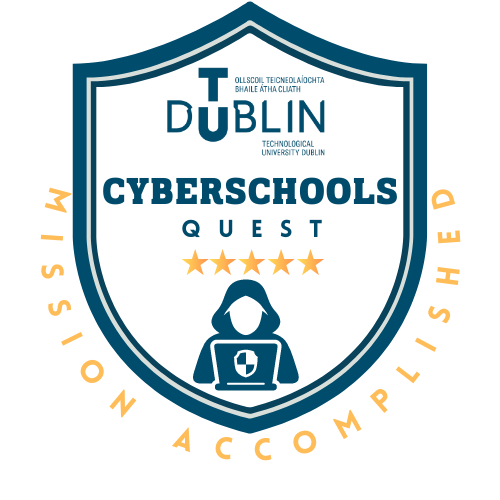
The TU Dublin strategy has partnership as a core pillar and within that, Internationalisation of the university
and its’ community. The badge aims to reward, celebrate, and foster internationalisation on campus
through student volunteering such as at a prestigious business case competition which the faculty will host
in 2024. This badge will incentivize students to participate in ‘Internationalisation-at-home’, enhance
transversal skills and give opportunities for students to engage in professional development and activity.
Learning Outcomes
- Demonstrate cross-cultural awareness and engagement with students and academic staff from participating universities drawn from across the globe; an emphasis on Global Culture Competence.
- Develop and enhance their transversal skills through the facilitating the successful implementation of an international academic case study competition event as part of a team of ambassadors [timekeeper for competition matches, room monitors, competition judges support, event management, and logistics]; an emphasis on Teamwork & Leadership.
- Enhance and develop intra and inter-personal communication skills with diverse international students and staff as well as organizational staff at TU Dublin.
- Articulate pre, during and post-event their learning through a reflective diary entry on completion; an emphasis on Civic Knowledge, Skills & Experience.
Expected Learner Effort in Hours
75 direct hours (9 hours training and preparation, 63 hours in competition
and 3 hours reflection and review)
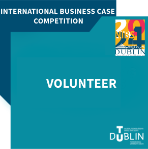
The Podcast series will centre on discussions of emerging issues in the field, and can take the form of short interviews/conversations with HR professionals locally, nationally and globally. This new series will enrich dialogic learning on the programme that points to emphasising genuine interaction among students and HR Professionals working in a range of organisations by encouraging mutual respect and understanding to develop what Kasepides (2012) termed the caring, critical and creative capacities of the students. Positive dialogue and the exchange of ideas aim to bring together the insights and understandings of the different participants to enable a fusion of perspectives on current issues, challenges and opportunities in the HR field today.
Learning Outcomes;
Learners will be able to
- Demonstrate a variety of perspectives on current issues, challenges and opportunities in the HR field today.
- Reflect on their learning and how they can apply it to their own personal and professional context.
Average Learner Effort Hours
Contact Hours; 8
Self Directed Learning hours; 16
Total Learner Effort; 24
Assessment
Learners will be asked to complete a short reflective blog post on what they have learnt from each podcast and how they can apply it to their own professional context.
Using technology and data responsibly has become a strategic objective for many technology companies. This requires access to education in digital ethics both from a teaching perspective, e.g., lecturers, or from the perspective of the general public e.g., industry professionals, students etc.
This digital badge is intended for those who would like to be introduced to the area of digital ethics but may not have the time to commit to a full 5 ECTS module. The badge allows them to be rewarded for their efforts. This badge will not be issued to those who are taking the full 5 ECTS module.
Learning Outcomes
- Introduce the general field of ethics.
- Describe a range of ethical theories, approaches, and perspectives.
- Discuss the practical concerns in ethics in technology in a variety of application areas.
- Apply ethical concepts and principles to address concerns in digital or computer ethics.
Expected Learner Effort (Hours)
20 hours
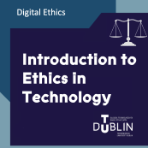
This digital badge recognises student achievement on a framework of entrepreneurship competences outside of the learner’s accredited programme curricula. The framework of learning outcomes for the proposed Digital Badge is designed around the European Commission EntreComp framework which sets out the competences that make someone entrepreneurial.
Learning can be achieved by the learner participation in a wide range of activities, including but not restricted to the following:
- Learner participation in enterprise activities including their own commercial or social enterprise activities;
- Learner participation in entrepreneurship or similarly focused competitions (e.g. Bolton Trust, Student Entrepreneur Awards, etc.);
- Student participation in ideation and hackathon challenges (e.g. TU Dublin President’s Sustainability Challenge, AWS Hackathon for Health, etc.);
- Learner participation in design thinking workshops and activities; and
- Learner participation in society activities (e.g. Enactus).
It is important to note that this list is not exhaustive and that the learner may have acquired the competences in other types of activities not listed.
The Digital Badge can be awarded at Foundation, Intermediate and Advanced levels. Learners will have opportunity to increase the level of Digital Badge by addressing target areas for improvement.
Learning Outcomes
The framework of learning outcomes for the Entrepreneurship Digital Badge is designed around the European Commission EntreComp framework which sets out the competences that make someone entrepreneurial.
|
|
Foundation |
Intermediate |
Advanced |
|
IDEAS AND OPPORTUNITIES |
|||
|
Spotting opportunities |
Learners can find opportunities to generate value for others. |
Learners can recognise opportunities to address needs that have not been met. |
Learners can seize and shape opportunities to respond to challenges and create value for others. |
|
Creativity |
Learners can develop multiple ideas that create value for others. |
Learners can test and refine ideas that create value for others. |
Learners can transform ideas into solutions that create value for others. |
|
Vision |
Learners can imagine a desirable future. |
Learners can build an inspiring vision that engages others. |
Learners can use their vision to guide strategic decision-making. |
|
Valuing ideas |
Learners can understand and appreciate the value of ideas. |
Learners understand that ideas can have different types of value, which can be used in different ways. |
Learners can develop strategies to make the most of the value generated by ideas. |
|
Ethical and sustainable thinking |
Learners can recognise the impact of their choices and behaviours, both within the community and the environment. |
Learners are driven by ethics and sustainability when making decisions. |
Learners act to make sure that their ethical and sustainability goals are met. |
|
RESOURCES |
|||
|
Self-awareness and self-efficacy |
Learners trust their own ability to generate value for others. |
Learners can make the most of their strengths and weaknesses. |
Learners can compensate for their weaknesses by teaming up with others and by further developing their strengths. |
|
Motivation and perseverance |
Learners want to follow their passion and create value for others. |
Learners are willing to put effort and resources into following their passion and create value for others. |
Learners can stay focused on their passion and keep |
|
Mobilising resources |
Learners can find and use resources responsibly. |
Learners can gather and manage different types of resources to create value for others. |
Learners can define strategies to mobilise the resources they need to generate value for others. |
|
Financial and economic literacy |
Learners can draw up the budget for a simple activity. |
Learners can find funding options and manage a budget for their value-creating activity. |
Learners can make a plan for the financial sustainability of a value-creating activity. |
|
Mobilising others |
Learners can communicate their ideas clearly and with enthusiasm. |
Learners can persuade, involve and inspire others in value-creating activities. |
Learners can inspire others and get them on board for value-creating activities. |
|
INTO ACTION |
|||
|
Taking the initiative |
Learners are willing to have a go at solving problems that affect their communities. |
Learners can initiate value-creating activities. |
Learners can look for opportunities to take the initiative to add or create value. |
|
Planning and management |
Learners can define the goals for a simple value-creating activity. |
Learners can create an action plan, which identifies the priorities and milestones to achieve their goals. |
Learners can refine priorities and plans to adjust to changing circum-stances. |
|
Coping with uncertainty, ambiguity and risk |
Learners are not afraid of making mistakes while trying new things. |
Learners can evaluate the benefits and risks of alternative options and make choices that reflect their preferences. |
Learners can weigh up risks and make decisions despite uncertainty and ambiguity. |
|
Working with others |
Learners can work in a team to create value. |
Learners can work together with a wide range of individuals and groups to create value. |
Learners can build a team and networks based on the needs of their value-creating activity. |
|
Learning through experience |
Learners can recognise what they have learnt through taking part in value-creating activities. |
Learners can reflect and judge their achievements and failures and learn from these. |
Learners can improve their abilities to create value by building on their previous experiences and interactions with others. |
Average Learner Effort Hours
24 hours – self-directed effort to prepare self-assessment, write-up of evidence, and critical reflection.
Assessment
The learner commences their pathway to the Entrepreneurship Digital Badge by completing an online self-assessment survey of their entrepreneurship competences. Across the three areas and 15 competences in the EntreComp framework. For each competence they are provided with statements with foundation, intermediate, and advanced descriptions of competences. They will select the level of competence that best describes their achievement.
For each of their chosen self-assessment levels the learner will then provide evidence of the activities that they have engaged in that have generated this competence. This will include a description of what they have done, or what they have participated in. For each of the claimed competences they will then be asked to reflect on what they have learner in relation to this competence.
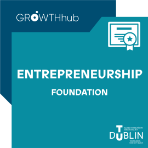
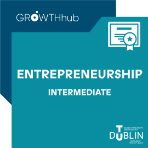
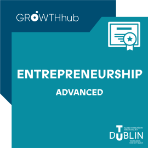
Design Thinking is an iterative process that focuses on understanding user needs, challenging assumptions, and redefining problems. For students, design thinking provides a creative and systematic approach for problem solving. It is a user-centred approach to solving problems. The needs of the person you’re solving the problem for is at the heart of everything you do. They are involved in telling you about the problem, brainstorming a solution, and helping you implement it. As a methodology, it can be used in all aspects of life, especially catalysing students to deliver better solutions for challenges they encounter in their TU Dublin studies (including project work), enhancing entrepreneurship activity they might engage in, or helping them deliver solutions that do good for the world we live in, whether that is in a professional and voluntary capacity.
The Digital Badge in Design Thinking introduces learners to the principles, tools and processes that support design thinking.
Learning Outcomes
Learners that meet the requirements for the award of the Design Thinking Digital Badge will be able to
- Describe the main principles for a successful implementation of the Design Thinking process.
- Apply the five steps of Design Thinking to a challenge.
- Appropriately select from and use the appropriate tools at each stage of the Design Thinking process.
Expected Learner Effort (Hours)
Asynchronous online learning hours: 8 hours
Self-directed learning hours: 16 hours
Total learner effort: 24 hours
Assessment
After completing the online training, the learner is introduced to a challenge to create and app or service that will help their assigned persona to reach their sustainability goals. Using a set of templates and tools provided the learner will go through the design thinking process stages. After going through the process, the learner will prepare a short presentation in which they introduce their persona and show how they prototyped the right solution to their problem.
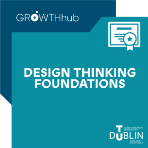
To recognize students who have actively engaged with the role of Class Representative. Students will need to have been elected as a Class Representative and actively engaged in the role.
Learning Outcomes
Upon successful engagement with the role of class representative, and completion of the relevant learning materials and activities developed as part of the Our Student Voice project, the Digital Badge applicant will be able to:
- Explain fully what is involved in the role of class representative;
- Identify the people with whom a class representative needs to engage or to whom a class representative can refer their fellow students in time of need;
- Articulate the role that students play in quality assurance and quality enhancement in Higher Education;
- Act in accordance with excellent practice in equality, diversity and inclusion;
- Reflect upon their own actions and performance, for the purpose of continuous improvement;
- Provide feedback that is accurate, balanced, constructive and depersonalized; and critique feedback according to these properties;
- Communicate in an impactful way in a variety of fora;
- Engage with their classmates to ensure that they are providing a voice for others when providing feedback or representing others;
- Prepare for, and perform effectively in meetings;
- Develop effective working relationships with students, academic staff and management.
Expected Learner Effort (Hours)
7-10 hours for the review of the Our Student Voice materials.
10-15 hours for the completion of the Our Student Voice learning activities.
In addition, in order to be effective in the role of class representative, will require at least 200 hours of active engagement over the academic year.
Outline of the proposed Learning Activities (to include delivery method)
The learning activities applicants are expected to carry out are detailed on the Our Student Voice website. See https://www.tudublin.ie/explore/about-the-university/academic-affairs/our-student-voice/apply-for-a-digital-badge/ .
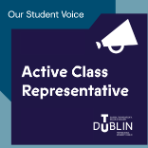
To recognize students who have actively engaged with the role of Curriculum Co-Designer. Students will need to have been invited to participate in the design of a progamme or module and actively engaged in the role, as evidenced by the provision of a supporting statement from their Year Tutor or Programme Coordinator.
Learning Outcomes
Upon successful engagement with the role of curriculum co-designer, and completion of the relevant learning materials and activities developed as part of the Our Student Voice project, the Digital Badge applicant will be able to:
- Identify the people with whom a students needs to engage in time of need;
- Articulate the role that students play in quality assurance and quality enhancement in Higher Education;
- Act in accordance with excellent practice in equality, diversity and inclusion;
- Reflect upon their own actions and performance, for the purpose of continuous improvement;
- Provide feedback that is accurate, balanced, constructive and depersonalized; and critique feedback according to these properties;
- Communicate in an impactful way in a variety of fora;
- Engage with their classmates to ensure that they are providing a voice for others when providing feedback or representing others;
- Prepare for, and perform effectively in meetings;
- Develop effective working relationships with students, academic staff and management;
- Design, evaluate and critique learning outcomes, learning and teaching methods and assessment methods as part of a curriculum design process.
Expected Learner Effort (Hours)
7-10 hours for the review of the Our Student Voice materials.
10-15 hours for the completion of the Our Student Voice learning activities.
In addition, in order to be effective in the role of curriculum co-designer, will require at least 20 hours of active engagement during the design process.
Assessment
The learning activities applicants are expected to carry out are detailed on the Our Student Voice website. See https://www.tudublin.ie/explore/about-the-university/academic-affairs/our-student-voice/apply-for-a-digital-badge/
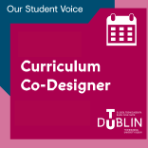
To recognize students who have actively engaged with the role of student member of a quality assurance panel. Students will need to have been invited to participate in a Quality Assurance Panel and actively engaged in the role, as evidenced by the provision of a supporting statement from the Quality Assurance Advisor on the panel.
Learning Outcomes
Upon successful engagement with the role of student member of a quality assurance panel, and completion of the relevant learning materials and activities developed as part of the Our Student Voice project, the Digital Badge applicant will be able to:
- Identify the people with whom a students needs to engage in time of need;
- Articulate the role that students play in quality assurance and quality enhancement in Higher Education;
- Act in accordance with excellent practice in equality, diversity and inclusion;
- Reflect upon their own actions and performance, for the purpose of continuous improvement;
- Provide feedback that is accurate, balanced, constructive and depersonalized; and critique feedback according to these properties;
- Communicate in an impactful way in a variety of fora;
- Engage with their classmates to ensure that they are providing a voice for others when providing feedback or representing others;
- Prepare for, and perform effectively in meetings;
- Develop effective working relationships with students, academic staff and management;
- Evaluate and critique programmes or organizational units according to the requirements of the student body.
Expected Learner Effort (Hours)
7-10 hours for the review of the Our Student Voice materials.
10-15 hours for the completion of the Our Student Voice learning activities.
In addition, in order to be effective in the role of student member of a quality assurance panel, will require at least 20 hours of active engagement during the preparation and panel process.
Assessment
The learning activities applicants are expected to carry out are detailed on the Our Student Voice website. See https://www.tudublin.ie/explore/about-the-university/academic-affairs/our-student-voice/apply-for-a-digital-badge/

Successful recipients of TU Dublin Digital Badges are listed on our Roll of Honour
